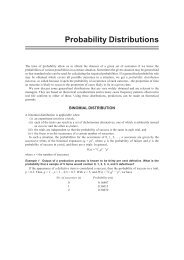International-Business-Dr-R-Chandran-E-book
International-Business-Dr-R-Chandran-E-book
International-Business-Dr-R-Chandran-E-book
Create successful ePaper yourself
Turn your PDF publications into a flip-book with our unique Google optimized e-Paper software.
153<br />
<strong>International</strong> <strong>Business</strong>- <strong>Dr</strong>. R. <strong>Chandran</strong><br />
The WTO, which has its headquarters in Geneva, Switzerland, has a<br />
membership of 150 countries. More than 98% of the global trade is<br />
transacted among the members.<br />
As the only regulatory body of world trade, the WTO’s objective is to ensure<br />
a freer, more transparent and more predictable trading regime in the world.<br />
The WTO is based on a sound legal system and its agreements are ratified<br />
by the parliaments of member countries. No one country controls the WTO;<br />
wherein the top decision makers are the designated ministers of member<br />
countries.<br />
The WTO agreements cover:<br />
• Goods, e.g., all industrial products, FMCGs etc.<br />
• Services, e.g., banking, insurance, consultancy etc.<br />
• Intellectual property, e.g., patents, copyrights, designs and trademarks<br />
etc.<br />
Two important principles that underline most agreements are:<br />
a) Most Favoured Nation Clause: No discrimination among member<br />
countries.<br />
b) National Treatment Clause: Equal treatment to imported and domestic<br />
products.<br />
These agreements broadly address three concerns:<br />
Same rule for all: It restricts governments or organisations from ‘distorting’<br />
normal trade by way of subsidising, dumping or discriminatory licensing<br />
policies. Government policies are framed to eliminate distorting effects. The<br />
WTO allows exports to be relieved of all indirect taxes such as excise, sales<br />
tax etc. since they have a cascading effect on the cost of the product.<br />
Administration of agreements: It has detailed guidelines as to how the<br />
agreements should be administered at a national level. These apply to antidumping<br />
proceedings, standardization, sanitary and phytosanitary measures,<br />
or settlement of disputes.<br />
Fair deal to businesses: It ensures rights for the business community e.g.,<br />
the right to information, the right to present evidence etc. For example, the<br />
Agreement on Customs Valuation allows the importer to justify the value of<br />
Only for Private Circulation





